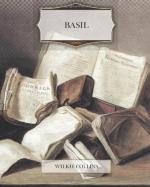I was not kept waiting long. Another violent crack from the new door, announced the entrance of Mr. Sherwin himself.
He was a tall, thin man: rather round-shouldered; weak at the knees, and trying to conceal the weakness in the breadth of his trowsers. He wore a white cravat, and an absurdly high shirt collar. His complexion was sallow; his eyes were small, black, bright, and incessantly in motion—indeed, all his features were singularly mobile: they were affected by nervous contractions and spasms which were constantly drawing up and down in all directions the brow, the mouth, and the muscles of the cheek. His hair had been black, but was now turning to a sort of iron-grey; it was very dry, wiry, and plentiful, and part of it projected almost horizontally over his forehead. He had a habit of stretching it in this direction, by irritably combing it out, from time to time, with his fingers. His lips were thin and colourless, the lines about them being numerous and strongly marked. Had I seen him under ordinary circumstances, I should have set him down as a little-minded man; a small tyrant in his own way over those dependent on him; a pompous parasite to those above him—a great stickler for the conventional respectabilities of life, and a great believer in his own infallibility. But he was Margaret’s father; and I was determined to be pleased with him.
He made me a low and rather a cringing bow—then looked to the window, and seeing the carriage waiting for me at his door, made another bow, and insisted on relieving me of my hat with his own hand. This done, he coughed, and begged to know what he could do for me.
I felt some difficulty in opening my business to him. It was necessary to speak, however, at once—I began with an apology.
“I am afraid, Mr. Sherwin, that this intrusion on the part of a perfect stranger—”
“Not entirely a stranger, Sir, if I may be allowed to say so.”
“Indeed!”
“I had the great pleasure, Sir, and profit, and—and, indeed, advantage—of being shown over your town residence last year, when the family were absent from London. A very beautiful house—I happen to be acquainted with the steward of your respected father: he was kind enough to allow me to walk through the rooms. A treat; quite an intellectual treat—the furniture and hangings, and so on, arranged in such a chaste style—and the pictures, some of the finest pieces I ever saw—I was delighted—quite delighted, indeed.”




